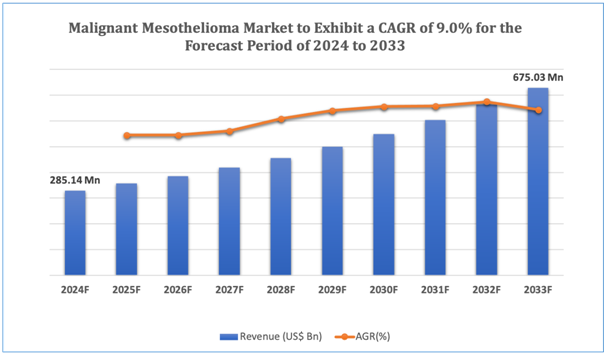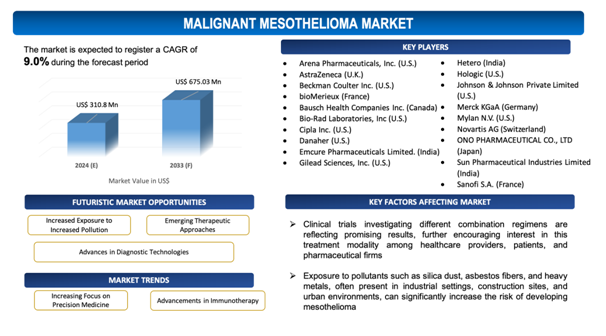Malignant Mesothelioma Market Overview
The global Malignant Mesothelioma market is estimated to be worth over USD 675.03 Mn in 2033 and is expected to grow at CAGR of 9.0% during the forecast period (2024-2033). Malignant mesothelioma, an aggressive and rare cancer, principally affects the mesothelial lining of the lungs (pleura), but can also occur in the abdomen (peritoneum), heart (pericardium), or testicles (tunica vaginalis). The disease is primarily caused by exposure to asbestos fibers, with a latency period scaling from 20 to 50 years between exposure and diagnosis. Attributing to its long latency period and the ongoing use of asbestos in varied industries, mesothelioma remains a worldwide health concern, with incidence rates changing across regions depending on historical asbestos usage.
The disease presents notable challenges in diagnosis and treatment, oftentimes diagnosed at an advanced stage when treatment alternatives are limited. The global market for malignant mesothelioma surroundsdifferent diagnostic tools, treatment modalities, and supportive care interventions focused at enhancing patient outcomes. Diagnostic approaches comprise imaging techniques such as CT scans, MRI, and PET scans, as well as biopsy procedures to confirm the diagnosis. Treatment alternativesare likely tocomprise surgery, chemotherapy, radiation therapy, and emerging targeted therapies or immunotherapies, depending on the stage and location of the cancer. Additionally, supportive care measures such as pain management, palliative care, and psychosocial support hold a critical role in enhancing patients' quality of life.
Despite advancements in treatment alternatives, prognosis for malignant mesothelioma remains poor, with a median survival ranging from months to a few years, highlighting the urgent need for further research and development of novel therapies. The global market for malignant mesothelioma is driven by factors such as the increasing incidence of the disease, advancements in diagnostic technologies and treatment modalities, and growing awareness among healthcare professionals and the public. However, challenges such as limited treatment efficiency, increased treatment costs, and the complexity of managing the disease contribute to market restraints. Nonetheless, continuing research efforts and collaborations hold promise for improving outcomes and addressing the unmet needs of patients affected by malignant mesothelioma.
Figure 1. Malignant Mesothelioma: Market Size

Get more details on this report - Request Free Sample
Key Market Insights &Current Market Landscape:
The global malignant mesothelioma market presents a complex panoramadefined by key market insights and major developments. Incidence rates of mesothelioma differ across the world, reflecting historical asbestos exposure patterns, with regions like North America, Europe, and parts of Asia witnessingincreased prevalence due to industrial asbestos use. Significant developments in the market comprise advancements in diagnostic techniques, such as molecular biomarkers and imaging modalities like PET scans, improving early detection and personalized treatment approaches. Therapeutically, while chemotherapy, surgery, and radiation therapy remain primary modalities, targeted therapies and immunotherapies are emerging as promising avenues, with continuing clinical trials assessing their efficiency in mesothelioma treatment. In addition to that, palliative care interventions are increasingly focusedon to improving patients' quality of life. Despite these advancements, challenges such as limited treatment alternatives for advanced disease stages, increased treatment costs, and the long latency period between asbestos exposure and diagnosis persist. Alongside, the complex interplay of regulatory frameworks and legal considerations surrounding asbestos exposure and compensation further impacts the market landscape. Nonetheless, collaborations between researchers, healthcare providers, industry stakeholders, and patient advocacy groups drive progress in addressing the unmet needs of patients affected by malignant mesothelioma.
Market Dynamics
Market Drivers
Increased Approval Gains for Efficient Combination Therapy
As the understanding of mesothelioma's complex biology grows, there is a recognition of the necessity for more effective treatment strategies. Combination therapies, which include the simultaneous use of multiple drugs or treatment modalities, provide the potential to target different aspects of the disease simultaneously, resultinginenhanced outcomes for patients. Regulatory agencies are increasingly recognizing the value of combination therapies in addressing the challenges of malignant mesothelioma, leading to more swift approvals for these treatment approaches. There are some firms that have patents for procedures, and there are some companies that are conducting clinical trials emphasizing on different combination drugs. For instance, Boehringer Ingelheim (B.I.) entered into phase 3 trial for its double-blind, randomized, phase 3 study of Nintedanib in combination with Pemetrexed or Cisplatin followed by the continuation of Nintedanib monotherapy versus placebo in combination with Pemetrexed / Cisplatin followed by continuing placebo monotherapy for mesothelioma treatment.Along with that, clinical trials investigating different combination regimens are reflecting promising results, further encouraging interest in this treatment modality among healthcare providers, patients, and pharmaceutical firms. The approval of efficient combination therapies not only diversifies the treatment options available to patients but also fuels market growth by spurring innovation and investment in research and development efforts aimed at developing novel combination approaches to combat malignant mesothelioma more effectively.
Market Restraints
With regard to numerous advantages of Malignant Mesothelioma, the market faces several challenges due to the unique characteristics and requirements associated with them. Some of the key market challenges include:
- High Costs: The high costs associated with mesothelioma treatment, comprising surgery, radiation therapy, chemotherapy, and supportive care, pose a significant financial strain on patients and healthcare systems, limiting access to optimal care and hampering market growth.
- Low Surveillance Rate: The low rate of surveillance and screening for mesothelioma contributes to late-stage diagnosis, reducing treatment options and overall survival rates. Limited awareness among healthcare providers and the general public about risk factors and early symptoms further aggravates this issue, leading in missed opportunities for early intervention.
Market Opportunities
Increased Exposure to Increased Pollution
Since urbanization and industrialization persist to expand across the world, so does the risk of environmental pollution, comprising airborne pollutants and carcinogens. Exposure to pollutants such as silica dust, asbestos fibers, and heavy metals, often present in industrial settings, construction sites, and urban environments, can significantly increase the risk of developing mesothelioma. Additionally, emerging pollutants from sources like vehicle emissions, industrial waste, and agricultural runoff pose new challenges in environmental health. This heightened exposure to pollutants not only raises awareness about the risks of mesothelioma but also creates a growing patient population in need of diagnosis and treatment. As a consequence, there is an opportunity for the market to respond with advanced diagnostic tools, therapeutic interventions, and supportive care measures customized to address the specialized challenges posed by environmental pollution-related mesothelioma cases. Furthermore, initiatives focused at pollution control, environmental regulations, and public health campaigns can contribute to mitigating exposure risks and mitigating the impact of pollution on mesothelioma incidence, underlining the prominence of comprehensive strategies in addressing this global health concern.
Market Trends
- Increasing Focus on Precision Medicine: There is a soaring trend towards precision medicine in the global malignant mesothelioma market, with an emphasis on molecular profiling, biomarker identification, and personalized treatment approaches tailored to individual patient characteristics and tumor biology.
- Advancements in Immunotherapy: Immunotherapy is emerging as a promising treatment modality in the malignant mesothelioma market, with continuing research and development efforts focused on immune checkpoint inhibitors, adoptive cell therapies, and combination regimens to harness the body's immune system for targeted cancer treatment.

Get more details on this report - Request Free Sample
Malignant Mesothelioma Market: Key Segments
By Treatment Type
- Chemotherapy
- Targeted Therapy
- Others
By Route of Administration
- Oral
- Parenteral
- Others
By End User
- Hospitals
- Homecare
- Specialty Clinics
- Others
By Distribution Channel
- Hospital Pharmacy
- Online Pharmacy
- Retail Pharmacy
By Key Geographical Regions
- North America
- Europe
- Asia-Pacific
- Middle East and Africa
- South America
Malignant Mesothelioma Market: Regional Analysis
North America dominates the market due to the increase prevalence of mesothelioma and large availability of treatment options for patient suffering of mesothelioma.Asia-Pacific has been witnessing a positive growth for global mesothelioma treatment market throughout the forecasted period due to the government funding and awareness.
Figure 4. Malignant Mesothelioma Market: Distribution by Region

Get more details on this report - Request Free Sample
Leading Malignant Mesothelioma Developers
Industry Trends and Global Forecasts, 2023-2035 report features an extensive study of the current market landscape, market size and future opportunities associated with the Malignant Mesotheliomamarket, during the given forecast period. Further, the market report highlights the efforts of several stakeholders engaged in this rapidly emerging segment of the biopharmaceutical industry. Key takeaways of the Malignant Mesotheliomamarket are briefly discussed below.
The report includes the list of players operating in the global Malignant Mesotheliomamarket. Some of the key players include:
- Arena Pharmaceuticals, Inc. (U.S.)
- AstraZeneca (U.K.)
- Beckman Coulter Inc. (U.S.)
- bioMerieux (France)
- Bausch Health Companies Inc. (Canada)
- Bio-Rad Laboratories, Inc (U.S.)
- Cipla Inc. (U.S.)
- Danaher (U.S.)
- Emcure Pharmaceuticals Limited. (India)
- Gilead Sciences, Inc. (U.S.)
- Hetero (India)
- Hologic (U.S.)
- Johnson & Johnson Private Limited (U.S.)
- Merck KGaA (Germany)
- Mylan N.V. (U.S.)
- Novartis AG (Switzerland)
- ONO PHARMACEUTICAL CO., LTD (Japan)
- Sun Pharmaceutical Industries Limited (India)
- Sanofi S.A. (France)
Recent Developments in the Malignant Mesothelioma Market
Several recent developments have taken place in the field of Malignant Mesothelioma, some of which have been outlined below. These developments, even if they took place post the release of our market report, substantiate the overall market trends that we’ve outlined in our analysis chronologically.
- On December 2022, PharmaMar has announced that the Swiss Agency for Therapeutic Products (Swissmedic) has granted Orphan Drug designation to lurbinectedin for the treatment of Malignant Mesothelioma.This decision is based on the orphan drug recognition granted by the European Medicines Agency in August, 2021.
Scope of the Report
The market report presents an in-depth analysis of the various firms / organizations that are engaged in this market, across different segments, as defined in the below table:
|
Key Report Attributes |
Details |
|
Base Year |
2023 |
|
Forecast Period |
2024-2033 |
|
CAGR (2024-2033) |
9.0% |
|
Treatment Type |
|
|
Route of Administration |
|
|
End User |
|
|
Distribution Channel |
|
|
Key Geographical Regions |
|
|
Key Companies Profiled |
|
